ASTANA – Kazakhstan’s Central Election Commission (CEC) closed the period to nominate the candidates for the upcoming parliamentary elections on Feb. 8. Here is a look (in alphabetical order) at what seven registered political parties in Kazakhstan came up with for their voters.
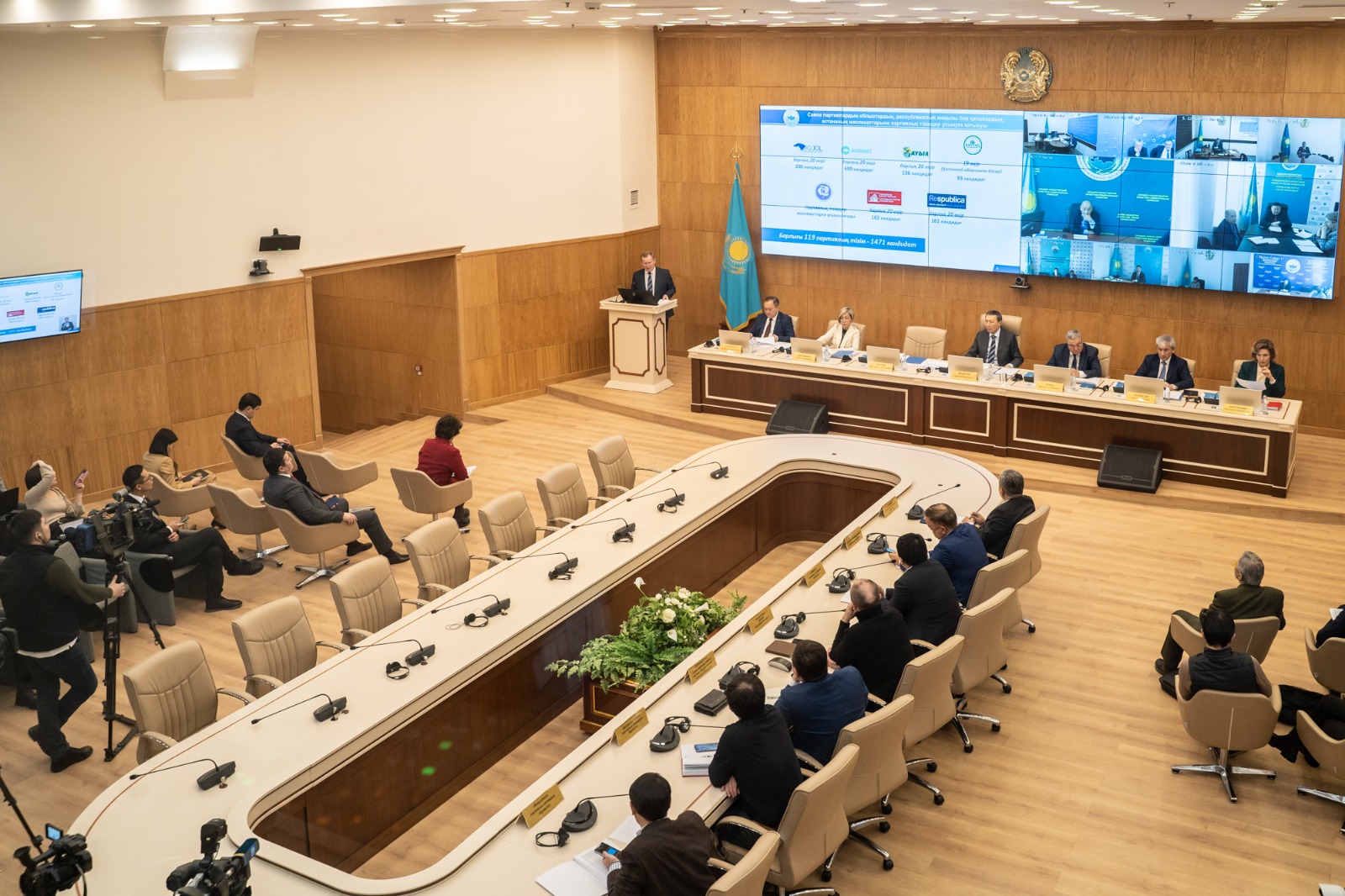
Central Election Commission (CEC) session on Feb. 9. Photo credit: election.gov.kz.
As March 19 comes closer, the chances for new faces to gain seats in the Mazhilis, the lower chamber of Parliament, are growing. Next month’s elections will take into account last year’s constitutional changes, as 29 deputies out of 98 in the chamber, or 30 percent, will be elected from single-mandate districts.
While the CEC is expected to register candidates by Feb. 18, political parties and citizens, nominated to stand in single-mandate districts, prepare for the election campaign in what is already being deemed as one of the most heated political races in Kazakhstan’s history.
Aq Zhol Democratic Party
At a Feb. 1 congress of the Aq Zhol (bright path in Kazakh) party, the members approved 54 people in the list of candidates for deputies of Mazhilis by party lists and 23 on a single-mandate basis. It also nominated 652 members from the party to the maslikhats of all levels.
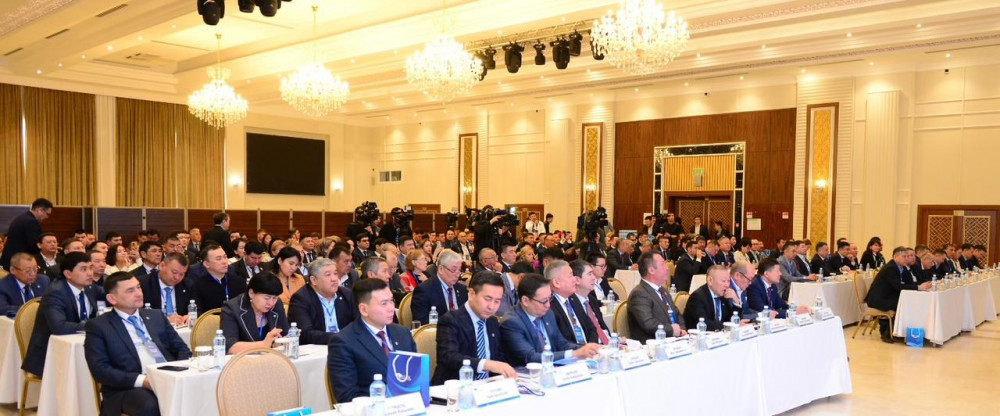
Ak Zhol party’s congress on Feb. 1. Photo credit: akzhol.kz.
Presenting the election program at the congress, Azat Peruashev, the party’s chairman, said Aq Zhol stands for the strengthening of parliamentary institutions and a gradual transition to a parliamentary republic.
“Democracy rests on the principle of promoting public interests through representative bodies – the Parliament and local maslikhats, which are the main institutions of parliamentarism. Democracy is parliamentarism,” he said.
The current task, however, is to ensure a “strong state” through the institution of the presidency, a lesson the nation has learned from the January 2022 tragedy, he noted.
The package of initiatives proposed by the party is designed to develop a real mechanism of checks and balances between the executive and representative branches of power, increase the powers of the Parliament and the maslikhats, promote demonopolization of the political field, create conditions for a fair party competition and ensure the openness of the state budget.
Amanat Party
The Amanat party adopted its final list of candidates at the party’s congress on Feb. 7, which gathered 2,000 people, including members of the party’s political council, former Mazhilis deputies, delegates from the regions, and members of the Zhastar Rukhy (youth spirit) youth wing.
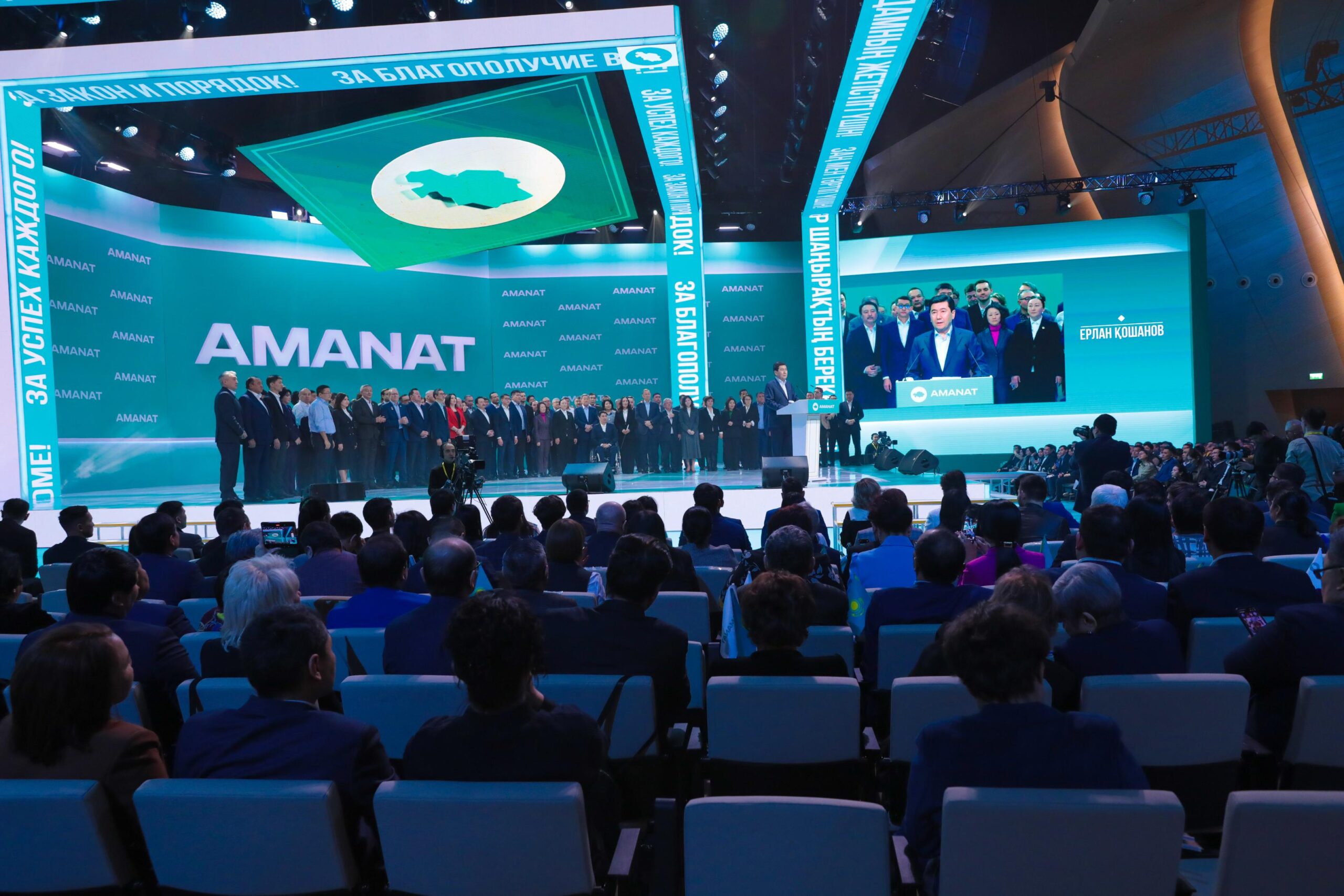
Amanat party chairman and Mazhilis Speaker Yerlan Koshanov addresses the party’s congress in Astana on Feb. 7. Photo credit: amanatpartasy.kz.
“We have transformed the party, abandoning empty promises and slogans. We moved from words to concrete actions in the political field and the issues that concern people the most,” said Amanat party chair and the previous Mazhilis Speaker Yerlan Koshanov.
The party nominated 3,821 candidates for the maslikhats of all levels and 119 candidates for the Mazhilis, including 90 based on the party list. Koshanov said the list includes “new and bright leaders capable of implementing the reforms.”
“They are representatives of all regions and branches. They are true statesmen and patriots of their homeland. I am sure our candidates will lead the party to victory because behind them are the honest party members and our people,” said Koshanov.
In the 2021 Mazhilis elections, the Amanat party, under its former Nur Otan name, won the majority of the votes, 71.09 percent, or 5,148,074 votes.
Auyl People’s Democratic Patriotic Party
The Auyl party submitted its list of candidates, which includes 25 people, on Feb. 8. Among them are two former presidential candidates, Karakat Abden and Zhiguli Dairabayev.
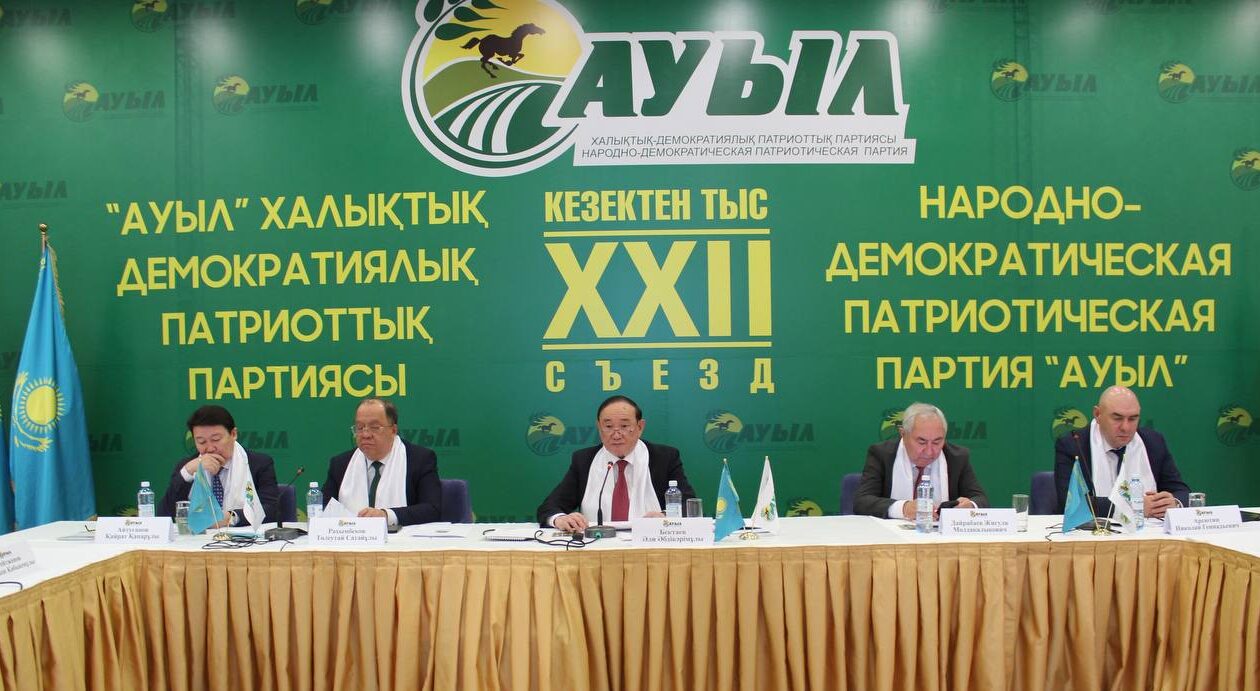
The Auyl party’s leadership during the extraordinary congress on Feb. 4 in Astana. Photo credit: auyl.kz.
The party said the list ensures equal representation of women, youth, and people with disabilities, who account for 36 percent of the candidates. Since 2020, party lists have been obliged to ensure a 30 percent quota for women, youth, and people with disabilities.
“The average age of the candidates is 43 years, and the youngest is 25 years old,” said the party in a statement.
Speaking about the agenda at the party’s congress on Feb. 4, Auyl Party Chairman Ali Bektayev said the party represents the interests of rural residents and villages.
“We represent the interests of the village, the interests of at least half the country’s population,” said Bektayev, emphasizing the development of agricultural and agro-industrial complex as their priority.
The congress also nominated nine candidates in single-mandate constituencies.
Baitak party
The Baitak party was registered in Kazakhstan last November, the first party to be registered in the past two decades, sending a positive signal of the country’s expanding political plurality. The party heads to the elections with a robust environmental agenda in tow.
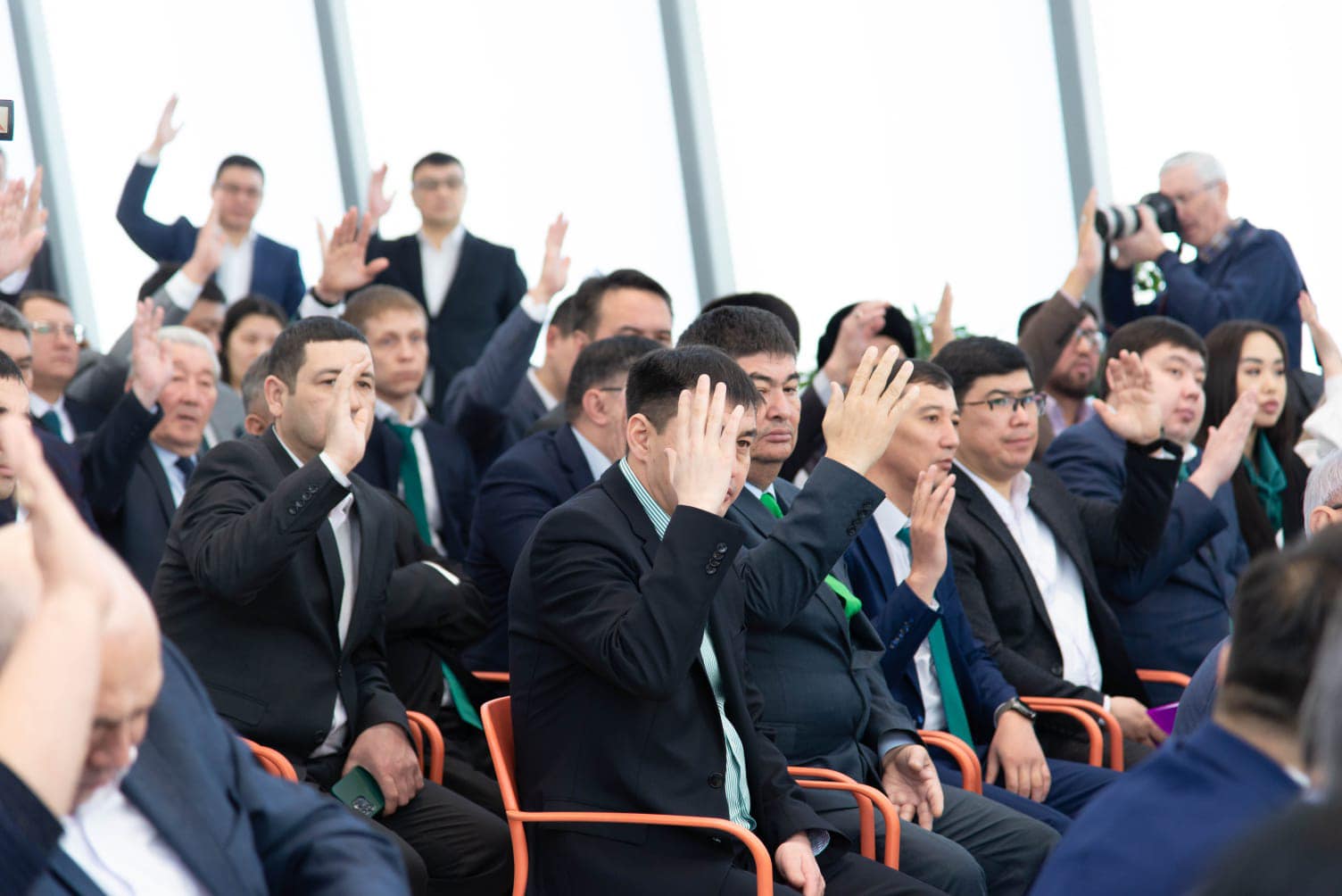
Baitak party members. Photo credit: the party’s Facebook page.
At their extraordinary meeting on Feb. 3, the Baitak party approved the list of candidates for the Mazhilis elections, which includes 20 people. They submitted the documents to the CEC on Feb. 6.
Speaking at the party’s congress, its chairman and founder Azamatkhan Amirtai emphasized that environmental problems in Kazakhstan are worsening, despite the state’s increased attention to them. He underlined the need for stringent measures to reduce greenhouse gas emissions and promote a green economy and financing.
In a December 2022 interview with The Astana Times, Amirtai spoke about his party’s priorities, highlighting the protection of the environment and public health and support for the Just Kazakhstan agenda, a paradigm encompassing the reforms and modernization process in the country.
National Social Democratic Party
The National Social Democratic Party submitted their documents to CEC on Feb. 6, after the party approved a list of 19 candidates for the Mazhilis elections by party lists on Feb. 2. Six candidates were nominated in single-mandate constituencies.
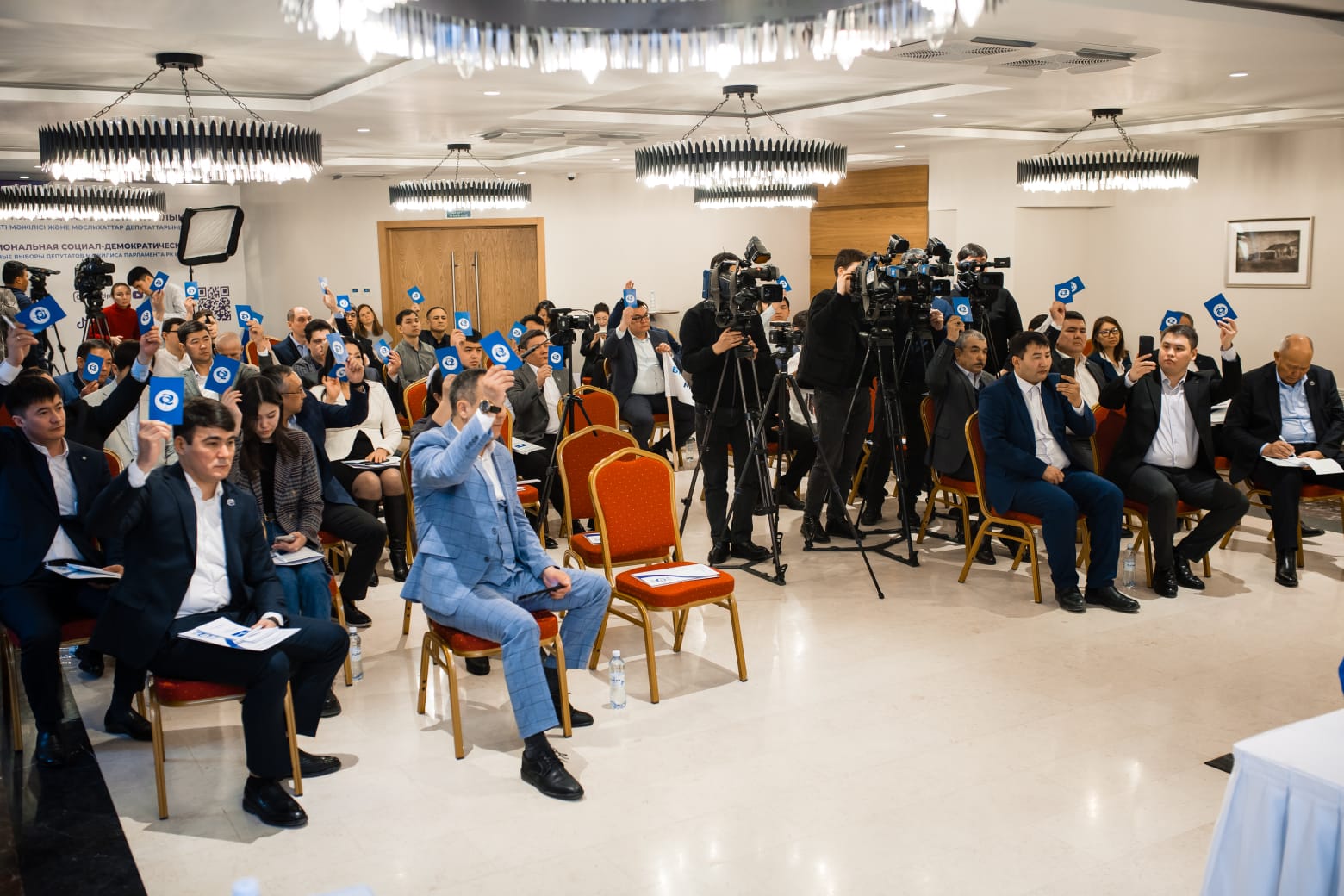
The National Social Democratic Party’s congress gathered 46 delegates from all regions of Kazakhstan. Photo credit: Facebook page of National Social Democratic Party.
Addressing the party’s meeting, its chairman Askhat Rakhimzhanov said the reforms mark a “responsible milestone” in the country’s history, and the party cannot stay on the sidelines.
“The accumulated problems in the economy, social policy, and other important spheres of the state significantly hamper political transformation. These problems need to be solved as soon as possible. What is needed are courageous actions by true patriots, not timid reports from bureaucrats in the government and parliament,” said Rakhimzhanov.
Nurlan Auesbayev, a party member, who will also seek a Mazhilis seat based on the party lists, ran for president last November, winning 2.22 percent of the vote.
People’s Party of Kazakhstan
The People’s Party of Kazakhstan nominated 52 members in its party lists, which it had submitted to the CEC on Feb. 1.
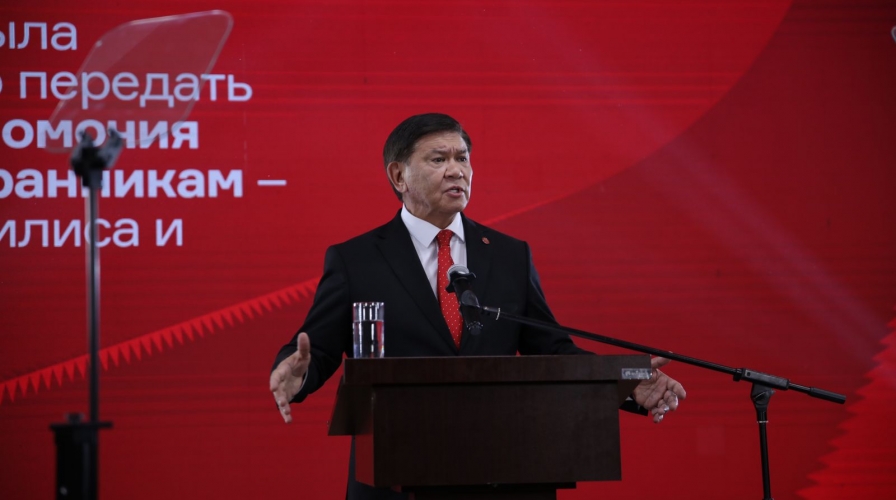
People’s Party Chairman Yermukhamet Yertysbayev. Photo credit: halykpartiyasy.kz.
“Originally, the list had more than 120 people. We decided to shorten the list considering the actual distribution of seats,” said party chairman Yermukhamet Yertysbayev, speaking at the party’s congress on Jan. 30.
Yertysbayev expects the party to take 40-45 seats in the parliament, saying the candidates were selected “from among the best and most worthy party members.”
“We have representatives of different ethnic groups and social strata in our ranks,” he said. “[There are] men, women and young people – entrepreneurs and state employees, mothers with many children and civil activists.”
The average age of the candidates is 50 years old. More than 32 percent of the candidates are women, young people, and people with disabilities.
According to the party’s press service, nearly 600 candidates were nominated for the maslikhats, and 40 percent are in single-mandate districts.
Respublica party
The Respublica party is the youngest party in Kazakhstan, receiving its official registration on Jan. 18, 2023. The party, founded by Kazakh entrepreneurs and public figures, nominated 25 candidates for the Mazhilis elections by party lists and four in single-mandate districts.

Respublica party members pose for a group photo at the party’s congress on Feb. 6 in Astana. Photo credit: Facebook page of the party’s founder Aidarbek Khojanazarov.
“There are 17 men and eight women. The average age of candidates for the Mazhilis is 38 years old. The youngest among the candidates is 25 years old, and the oldest is 51. Four people were nominated in single-mandate districts,” Olzhas Kuspekov, head of the party’s national electoral headquarters, told journalists at the CEC.
The list of candidates was endorsed by party members during their congress on Feb. 6 in Astana, which gathered heads of the party’s 20 branches and more than 200 delegates from all over the country.
“First of all, we want to reform the agricultural development program. Not subsidies to change but fundamental changes to rehabilitate the whole industry. We need a food security doctrine – from education, infrastructure in the village, and the internet, to drinking water quality,” wrote the party’s chair Aidarbek Khojanazarov on his Facebook. “We are ready to offer a strategic vision and a solution to the accumulated problems in each industry.”
